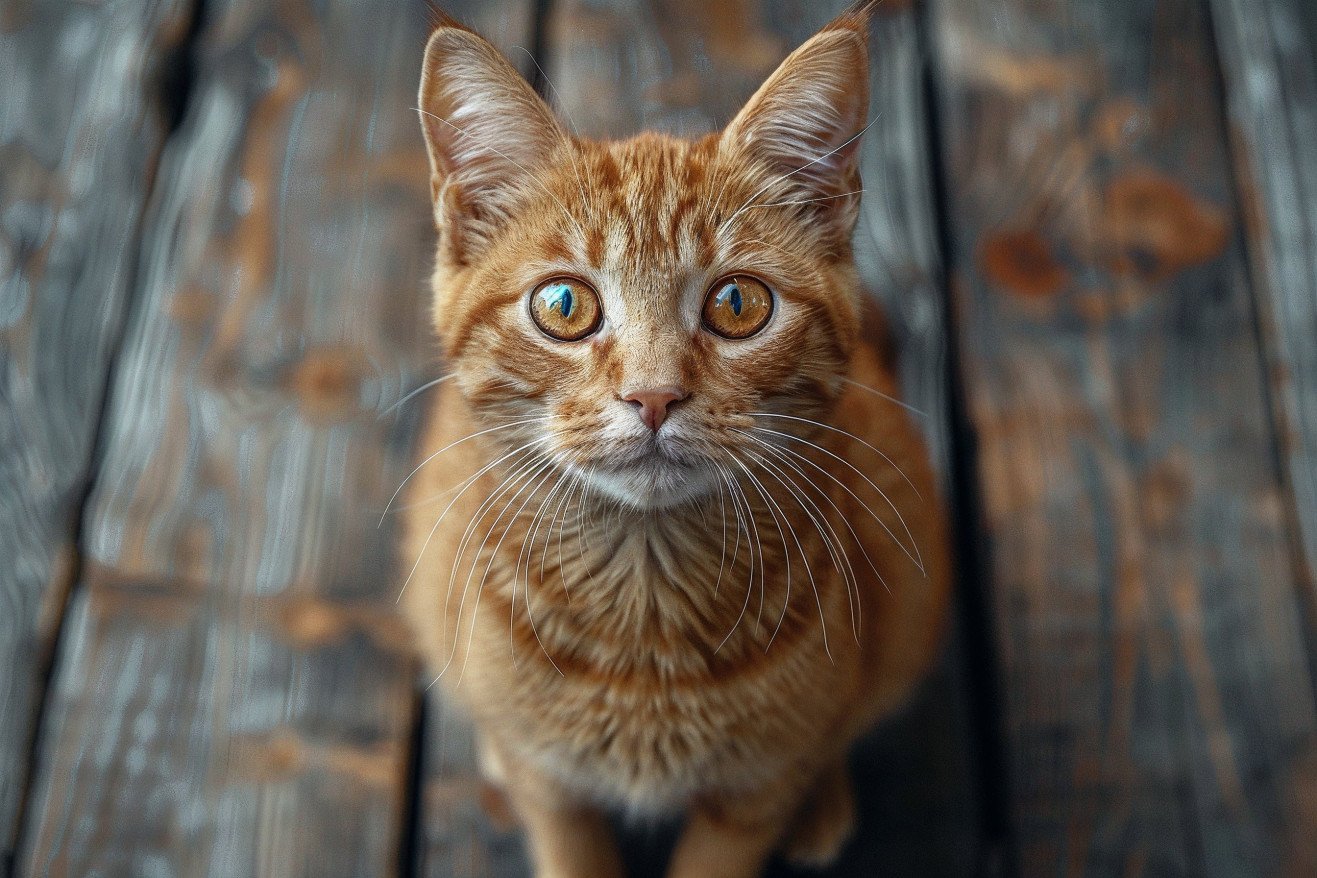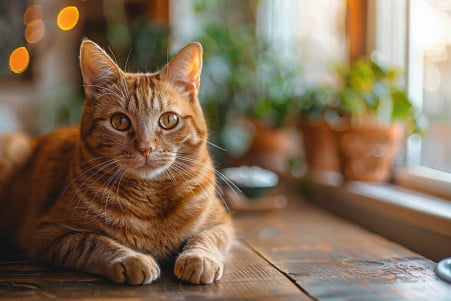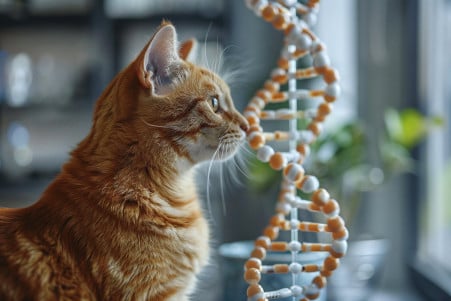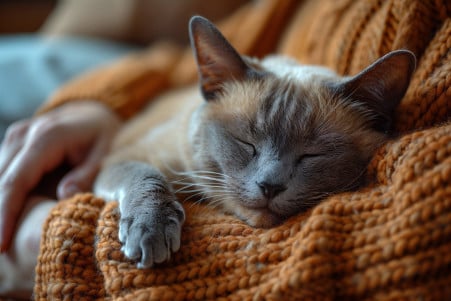Why Are Orange Cats So Crazy? Science Explains
26 March 2024 • Updated 25 March 2024

Although orange cats are often known for their playful and sometimes wild behavior, the truth behind their perceived "craziness" is a lot more interesting and has to do with a mix of genetics, hormones, and even the way they act. Orange cats are more likely to be outgoing, vocal, and loving because of their high levels of pheomelanin, a pigment that's also associated with higher levels of dopamine and adrenaline, making them seem like lovable risk-takers.
We'll go through scientific research from feline genetics, animal behavior, and evolutionary biology experts that explains why orange tabbies have such unique personalities compared to other cat colors. In addition to the biological reasons, we'll also look at how the environment and human behavior contribute to the special traits and behaviors of these lovable pets. You're about to learn to love your orange cat in a whole new way.
Is there a correlation between a cat's fur color and its personality?
The 'Crazy' Orange Cat Personality Stereotype
The idea that orange cats are more active, talkative, and loving than other cats is a well-known stereotype. According to Know Your Meme, the "orange cat behavior" meme that claims these cats are "more chaotic, more affectionate and more stupid" first went viral in 2019. This stereotype has been perpetuated by popular videos and stories about mischievous ginger cats like Jorts the Cat.
Studies have shown that people tend to attribute personality traits to cats based on their fur color. A 2012 study from UC Berkeley found that orange cats were considered to be the friendliest, while white cats were considered to be the most aloof. Meanwhile, a 2020 study documented the "Black Cat Bias" that leads to black cats being euthanized at higher rates, which the researchers attributed to coat color stereotypes.
These stereotypes appear to be based on human prejudices and preconceived notions. As Daniel Warren-Cummings of the UK's Cats Protection explains, surveys on cat behavior often reflect the owner's personal interpretation of traits like "friendliness." A study in Anthrozoos found that people were much more likely to use personality descriptors like "intolerant" to describe tri-colored cats and "friendliness" to describe orange cats, even though there was little evidence to support these differences.
While some cat owners have offered personal stories about their ginger cats' particularly loving or mischievous behavior, these stereotypes are likely the result of confirmation bias - people are more likely to notice behaviors that confirm their pre-existing beliefs about orange cats.
In addition, a cat's behavior and personality are shaped by a wide range of factors, including their environment, genetics, and their interactions with their owners. As a study from Mexico's UNAM explains, while owners do perceive differences, a cat's fur color alone may not be a reliable predictor of their temperament.
Investigating the Genetics of Cat Personalities
Genetic and hormonal influences on cat personality have been widely studied. For example, it has been shown that specific cat breeds have unique personality traits due to their genetics. A 2019 study that included over 5,700 cat owners found that there were significant differences in behavior between breeds, with Turkish Vans being the most aggressive and Russian Blues being the most shy.
These traits are highly heritable, with the same study estimating heritability at between 40-53%. This means that a cat's personality, including their levels of friendliness and aggression, can be largely determined by their father's genes. As one article puts it, "friendly tomcats produce friendly kittens, while aloof fathers create aloof offspring."
Hormones, including dopamine and adrenaline, also appear to be involved in shaping a cat's personality, leading to the more confident and active behaviors seen in some cats. In fact, studies have shown that a cat's reaction to catnip is 79% determined by genetics.
At the same time, however, the research also shows that we still have a lot to learn about the genetics of cat personalities. For example, as a thesis paper explains, most cat personality traits are influenced by many genes, which makes it hard to identify specific genetic contributors. More in-depth research is needed to fully understand the complex biological roots of cat behavior.
Cultivating Your Cat's Personality
In the end, every cat is an individual, and their personality is shaped by a lot more than the stereotypes that come with their fur color. Research has shown that a cat's personality is the result of a complex interaction between genetic, hormonal, and environmental factors, and it's not just because they're ginger.
So, as a new cat parent, the best way to cultivate your cat's personality is to make sure that they're in an environment that allows them to be themselves. This means that you should consider training that's tailored to your cat's needs, as well as regular play and mental stimulation through puzzle toys and food puzzles. These are all things that will help your cat be the best they can be, no matter what color they are.
Many cat parents have also found that forming a close bond with their cat is important, no matter what stereotypes they may have heard about their fur color. One study even found that cat parents who focused on their pet's individual needs and personalities, rather than stereotypes, formed stronger bonds with their cats. So, by embracing your cat's personality, you'll be able to find the things that make them a truly unique and irreplaceable pet.
Closing Thoughts: Understanding the Personalities of Orange Cats
There's no doubt that ginger cats are special. With their beautiful coats, playful nature, and loving disposition, it's easy to see why they're so popular. And while the stereotype of the "crazy orange cat" may be based in some truth, it's important to remember that each cat is an individual with a unique personality that's shaped by a combination of genetics, hormones, and environment.
Whether your orange tabby is a bold, talkative extrovert or a shy, independent introvert, the key to understanding their personality is to focus on their individual quirks and traits. Whether you're talking to other cat owners about your ginger cat's funny, sweet, or mischievous behavior, or just enjoying their energy and enthusiasm for life, the most important thing is to make sure you're meeting their needs through proper care, training, and enrichment.
In the end, the joy that these cats bring to our lives is bigger than any stereotype or generalization. By focusing on the individual instead of the color of their fur, you can get to know and appreciate the special qualities that make ginger cats such beloved pets.


